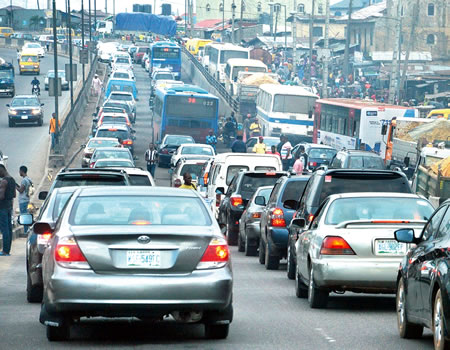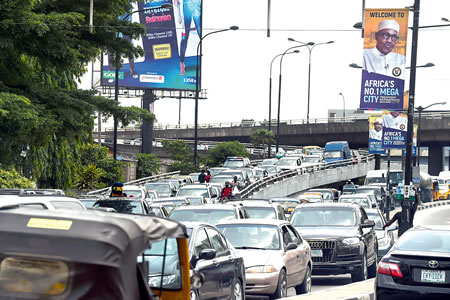Is the roll-out of fines for traffic offences in the aquatic city a new gold mine for the enforcers? AYOMIDE OWONIBI-ODEKANYIN attempted finding an answer.
THE proliferation of task forces on the enforcement of the controversial new Lagos State traffic laws is threatening the expected success of the new regulations, which are aimed at permanently curbing the traffic crisis the state has always been known for, Saturday Tribune findings have shown.
The administration of Governor Babajide Sanwoolu has made the seemingly intractable traffic and environmental issues in the state the focal point of his first days in office and to underscore the importance attached to the policy, the issuance of the executive order to drive it was his first official act.
Okorocha to Ihedioha: You can’t order my arrest, it’s a direct…
He also promised robust implementation and enforcement of the violation codes, stating that different law enforcement agencies in the state would partner to deliver on the policy.
While the state Task Force is believed to be implementing the new laws within the ambit of the governing laws, other security agencies, particularly the police, have been observed to be observing the implementation in breach of the laws that should guard the exercise, particularly in the area of imposing fines attached to the various violations listed in the new traffic laws.
Following a landmark judgement in 2014 by a Federal High Court in Lagos voiding the powers of the Federal Road Safety Corps (FRSC) to impose fines on motorists for traffic offences, many of such enforcement agencies, both at state and federal levels, seem to have taken their cue from the judicial precedent, though the FRSC appealed the case that came to the fore in 2016.
In the ruling delivered by Justice John Tsoho in a case brought by Tope Alabi, a lawyer whose vehicle was impounded for an alleged traffic offence, the court agreed with the plaintiff that “in the circumstances, I endorse the plaintiff’s submission that by the virtue of Section 1 (3) of the constitution, the power to impose fine conferred on FRSC by the enabling act is null and void to the extent of its inconsistency with the constitution.
“FRSC’s function should not be beyond issuance of mere notices of offence. It is a cardinal principle of natural justice that no person can be condemned without being heard. It is in observance of this that a person alleged to have committed an offence has to respond to such allegation before a court of law during trial.
“From these definitions, it is obvious that the act of sentencing is a judicial action or exercise and imposition of fine connotes conviction for an alleged offence.
“It is, thus, very clear that the FRSC, not being a court of law, cannot impose fine, especially as it has no powers to conduct trial.”
On the confiscation of the plaintiff’s vehicle, the judge said, “I hold the view that the confiscation of the vehicle was unnecessary in the first place, though the FRSC spiritedly sought to justify it.”
Reign of impunity?
Probably banking on Nigerians not always taking the time to know about their rights under the law, let alone insist on enforcing such rights, findings have revealed a reign of impunity by the enforcers of the traffic laws in Lagos State, particularly uniformed police personnel who extort motorists in the name of enforcing the laws.
In the outgoing week, policemen and women camped out on CMD Road, Shangisha, Magodo, embarking on an extortion spree, using alleged violation of the traffic codes as an excuse. No mobile court was anywhere in their vicinity and once they accused any motorist of breaking the law, the officers got into negotiation of the fines listed against such violations, while recalcitrant motorists were threatened with impoundment of their vehicles. Saturday Tribune’s reporter spent a couple of minutes at the scene and observed the drama. No one was officially booked for any offence, yet cash kept exchanging hands as vehicles were flagged down one after the other in an operation that could be described a bumper harvest for the personnel involved.
Despite the constant invocation of state office while issuing threats to make motorists yield to their demands, no single alleged offender was moved from the scene to the said office throughout the period Saturday Tribune’s reporter spent around the officers.
Findings showed that the drama on CMD Road has become the standard of enforcement for those saddled with the responsibility, save for the Task Force, which is said to regularly go out on enforcement exercise with at least a mobile court.
Toyota to build vehicle assembly plants in Ghana, Ivory Coast
Falana, others react
A leading human rights lawyer, Femi Falana, told Saturday Tribune that no enforcer could impose fines without recourse to the courts, adding that officers extorting motorists should also be punished for financial crime against the state government.
“What the courts are saying is that LASTMA [Lagos State Traffic Management Authority] cannot arrest, convict or impose fines on traffic offenders. The practice is a contravention of the doctrine of nemo judex in causa sua, i.e., a person cannot be a judge in his or her own case. The Lagos State government will have to refer suspected traffic offenders to mobile courts. At the same time, the state government should sanction LASTMA officials who extort money from motorists because the government is also defrauded in the process,” the Senior Advocate of Nigeria said.
Another legal practitioner, Adeola Odusole, agreed with the senior advocate. He pointed out that only the prosecution of traffic offenders in court of law was in tandem with the law.
“The truth is that each state has its own dos and don’ts. To fault it means breaking the law as it is. For example, a driver is caught speeding on the lane specially provided for BRT buses and he gets his car impounded while being also asked to pay a fine, if not satisfied with the punishment meted out to him, he can now choose to drag the Lagos State government to court for wrongful arrest.
“I believe the government is still working under the ambit of the law. Truth is, we might grumble and complain that some dos and don’ts are unacceptable but we can only challenge them if we take proper legal actions.
“For example, the monthly environmental sanitation that was cancelled, it took the intervention of a lawyer who pursued the matter diligently for about three years before it was abolished.
“We should also remember that we have traffic courts which analyse the evidence before passing judgement. Bottom line is, these traffic laws are meant to be obeyed in order to sanitise our roads,” he said.
In his contribution, another legal practitioner, Mr Alphonsus Eze, pointed out each state in Nigeria is governed by its own laws.
“Each state has an attorney-general and commissioner for justice. That is why there is constant review of existing laws governing the affairs of the state. The government, I believe, foresaw unnecessary civil suits and that is why it set up mobile courts to try lesser offences like loitering, traffic offences and littering. The magistrates appointed in these courts operate within the confines of the law. There are laid-down rules which the magistrate invokes in sentencing offenders. If a defendant is not satisfied, he or she can then decide to sue the government on whatever grounds,” he said.
Sanwo-Olu’s revolution or job for the boys?
It is no longer an uncommon feature to see Governor Sanwo-Olu direct traffic in the state and one common feature is the endless traffic, popularly called ‘go slow’ or ‘hold-up,’ which, like a demon, has taken over the soul of the state.
As the saying goes in Lagos, if you have an appointment by 9.00 a.m., it would be best to leave your house by 5.00 a.m., particularly if you are crossing over from the Mainland to the Island. Even with the rush against time, you can still spend up to four straight hours in one spot without any explanation. Lagos traffic appears and disappears only to reappear, dragging into the night.
The only time Lagos roads are probably ever free is in the night and on some public holidays but then anything can still happen and you can still find yourself stuck in traffic until the wee hours of the morning, only to be joined in the early morning traffic congestion of those people hurrying to their various place of work.
It is also interesting to note that there are some products that you will ordinarily not see on supermarket shelves but you will definitely see in Lagos traffic.
What then exactly causes traffic in the state? This had been the question on the lips of past administrations and even residents. Why have the roads now become so disorderly? Is it the high population, or the large numbers of cars that run through Lagos roads? Or is it the bad roads or simply the impatience of road users?
The current administration, however, promised to reduce the problem to the minimum and the promised revolution to tackle it led to LASTMA, on June 17, announcing new penalties for traffic offences, ranging from N5,000 fine to N50,000 fine and jail terms to forfeiture of vehicles.
It is also worthy of note that there is a fine of N200,000 for one-way offences, while for commercial and private motorists, failure to use seat belts, unclosed doors or standing on the doorway while in motion, now attract a fine of N20,000.
Offences such as parking on the highway, obstruction of traffic, picking or dropping passengers at illegal bus stops attract a fine of N50,000.
Also, making a reverse on the highway, driving on and parking on walkways now attract a N50,000 fine as penalty. Driving on BRT-designated lanes attracts a fine of N70,000. Dropping passengers on lay-bys comes with a N90,000 fine. Furthermore, for every night a seized vehicle spends in the custody of LASTMA, a N1,000 fine is paid.
Is revolution delivering?
On Wednesday, the Lagos State Environmental Sanitation and Special Offences Agency, also known as Task Force, made what could be considered its biggest haul of arrests, seizing not fewer than 125 motorcycles, for allegedly flouting traffic regulations and for safety reasons. Though the subsisting law says the enforcers lack the legal power to impound, the motorcycles have been taken into custody by the Task Force, with CSP Olayinka Egbeyemi disclosing that they were impounded around Ejigbo and Cele Bus Stop. He promised the prosecution of the operators, though by law, they should have been prosecuted at the mobile court, for appropriate judicially-backed sanctions. Going by precedent, if any of the alleged offenders should sue today, the state government is going to be in breach of the extant laws and possibly asked to pay damages, as was in the case with Tope Alabi V. FRSC, where the plaintiff secured the award of N1 million damages.
A LASTMA official who spoke with Saturday Tribune on the condition of anonymity said: “Imposing a fine of N200,000 will keep motorists at alert in order not to flout these new traffic rules. The fines used to be as low as N20,000 which could easily be paid, but the rules have changed.”
It is equally worthy of note that two traffic offenders recently forfeited their cars to the state government after passing through ‘one way’ in Ikeja. This punishment was meted out after a court ruling against them.
Recently, too, a Lagos State mobile court ordered the permanent forfeiture of nine vehicles confiscated from their owners for driving against traffic along Oshodi-Mile 2 Expressway. The presiding magistrate, Salau Omobola, also ordered the drivers of the vehicles to perform 20 hours of community service. They pleaded guilty to the offence when the charge was read to them in court.
The chairman of the Task Force, Olayinka Egbeyemi, said: “they ran into our enforcement team while we were returning from a demolition exercise at Eric Moore and Orile-Iganmu along Lagos-Badagry Expressway.” He disclosed that residents and motorists had complained about the activities of drivers moving against traffic and causing serious gridlock daily along the axis.
“It is painful that with a high level of enlightenment campaigns and several warnings by the government, motorists, including private car owners, can still be driving against traffic in such a manner, thereby blocking oncoming vehicles and causing standstill at Iyana-Isolo,” he added.
He advised the remaining 12 drivers who abandoned their vehicles and ran away to avoid arrest to immediately report to the agency for prosecution.
Civil society kicks
The chairman of the Centre for Anti-Corruption and Open Leadership, Mr Debo Adeniran, described the new traffic rules as draconian, adding that the laws were not created to ease Lagos traffic.
“The traffic laws are too draconian for the kind of civilised society that Lagos is expected to be. If the roads are good and the people are violating the traffic laws, then that would be a different issue. The law is not just punitive but it is too draconian for any decent society. This government seems to be misplacing its priority. What we expect the new Lagos State government to do is to ensure that the basic welfare of the people in terms of transportation is well taken care of.
“We expect that they will ensure that the people are satisfied with the road network. The governor ought to have consolidated on the gains of the past administration by ensuring that road projects initiated by it are completed in time,” Adeniran said.
Other civil society groups and advocates also frowned on the new executive order on traffic laws and penalties for offences in the state.
The Committee for the Defence of Human Rights (CDHR), described the governor’s order as “unfair. The vice president of CDHR, Lagos branch, Olatunde Owoeye, condemned the governor’s decision to issue the executive order.
“There are potholes and bad roads everywhere and there has not been any attempt to repair them. Even what FRSC is charging for fine is far less than what Lagos State government is charging. Are they telling us they are superior to the Federal Government? We are trying to decongest the prisons but the Lagos State government keeps congesting them by criminalising minor offences,” he said.
Drivers, residents speak
Many residents of the state welcomed the new traffic laws at least with the hope that it will ease the traffic situation and restore order on the roads.
Tackling the traffic situation in the state leans heavily on the new traffic laws. Even with the executive order to end Apapa gridlock in 60 days, the area is still a nightmare. Not only are tankers still packed indiscriminately, the situation of the roads is a nightmare, hence the heavy traffic in the area.
Mr Raphael Okolie, a bank official who plies the Ikorodu-CMS route said the government’s directive was a welcome development as it had brought sanity to the roads. Okolie said: “Many road users take the laws into their hands by driving without caution thereby making life unbearable for other road users. I think a full enforcement of traffic rules is in the best interest of all of us and the state. Impunity is too much among motorists, especially these commercial bus drivers and operators of tricycles.
“In fact, you see that when some of us give way for pedestrians to cross at zebra crossing, some drivers will be abusing us while some impatient motorists will almost run them down. I think it is good to enforce traffic rules,” he said.
Mrs Grace Kasali, a retiree and a car owner, corroborated Okolie, decrying reckless driving and attitudes of most road users. Kasali said: “It is a good thing that the new government came up to enforce traffic law in the state.
“Some of us are law abiding and will not flout rules but we have a lot who will not care at all, thereby bringing suffering to other motorists. Thank God for this government, under-aged driving is disastrous. We see many of them. What experience do they have, especially the motor boys of articulated and commercial vehicles. Abroad, from where I have just returned, you don’t just drive because you feel you can; you have to be tested and certified.
“But here in Nigeria, anything goes; checks on the use of unbranded vehicles for commercial purposes will also reduce incidence of ‘one chance’ and other crimes.”
She pleaded with the government to train traffic law enforcers to be civil by helping motorists rather than waiting for them to flout the laws.
Mr Haruna lbrahim, a company driver, said: “The laws are good; they will enable most companies to put their vehicles in order. Some companies’ vehicles are so rickety that they constitute nuisance on the road but because they belong to reputable companies, nobody cares. Some companies’ vehicles don’t have valid documents even their drivers drive without driving licences,” he submitted.
Fines on the high side?
Meanwhile, Mr Seye Agunbiade, a commercial bus operator, said that full enforcement would affect so many motorists, adding that the fines and penalties were too high.
Agunbiade said: “These laws and penalties are going to send most people out of business. Government must act with human face. We voted for this government with hope for a better future; not to make life unbearable for us. The fines and penalties are too much and should be revisited. Although some of the traffic rules are good, the penalties are too harsh. The government should review them with our union leaders,” he said.
Mr Monday Ogaga, another commercial bus driver, said he was a responsible driver who knew traffic rules and would not flout them. Ogaga also complained that the fines and penalties were not friendly and must be reviewed.
Transport experts are of the view that if all motorists play by the rule, the chaos on Lagos roads would be minimal and LASTMA officials would have little work to do.
Hopeful?
As the administration moves toward its first 100 days in office, the effect of the executive order is definitely one major plank to assess Sanwo-Olu’s revolution. Is it delivering so far?
A private car owner, Olamilekan Ibrahim, who has regularly plied Ikorodu Road, pointed out that the situation was fair. “People are more aware and are even scared of having their vehicles impounded. LASTMA officials are also up and doing as they have the direct backing of the governor,” he said.
Also speaking with Saturday Tribune, another motorist, Adelakun Ebenezer, who regularly plied Ikeja and Maryland, said: “These days, there is no reason for unnecessary traffic gridlock. Most drivers now stay in their lanes. Even commercial bus drivers are now seemingly law abiding as they are afraid for their meager source of livelihood. I believe that the laws are not excessive. Truth is: if you, as a motorist, do what is right, no one would force you to pay heavy fines. Even LASTMA officials are more cooperative. They are well behaved now,” he said.
Also commenting, a driver along the Ogudu-Ojota Road who identified himself as Kola Emmanuel pointed out that the traffic situation and compliance with traffic laws have increased considerably. “There is usually heavy vehicular movement around the Pako and Ramat Bus Stop. The gridlock used to be terrible but the government recently fixed the potholes which has eased the situation considerably,” he said.
Lagos traffic rules and fines signed by Sanwo-Olu
- Driving without a driver’s licence means your vehicle would be impounded.
- Driving of any vehicle by a person under 18 attracts a N30,000 fine.
- Driving with fake number plates attracts a fine of N30,000 fine, or three years in prison.
- Driving with forged vehicle particulars means six months in prison, while driving with fake driver’s licence is six months in prison.
- Disobeying LASTMA officer, N30,000/impound vehicle.
- Neglect of traffic direction light, three months in prison.
- Smoking while driving, N30,000/impound vehicle.
- Physically assault traffic officer attracts N50,000/six months in prison.
- Driving without full light, N50,000. Driving with worn-out tyre, N30,000.
- Driving without spare tyre, N30,000.
- Driving a smoking vehicle, N30,000. No fire extinguisher, N30,000.
- Broken windscreen,N30,000. Tinted windscreen, N30,000.
- Eating and driving with one hand, three months in prison.
- One way driving, three years in prison.
The list goes on as the new laws are 64 in number.







